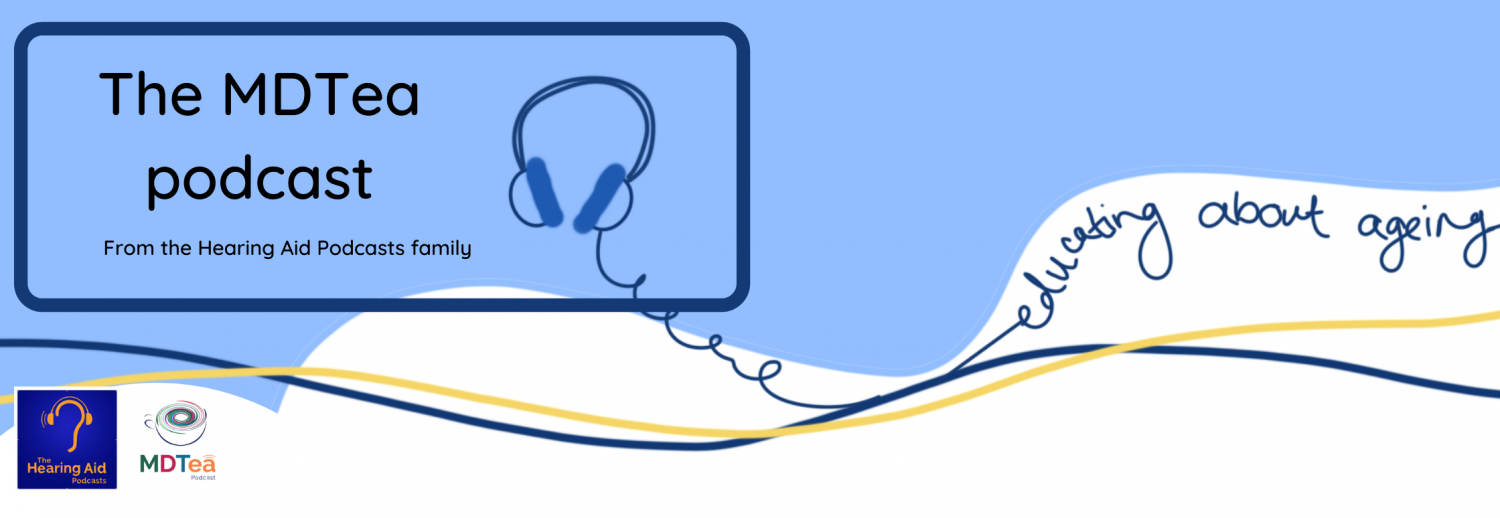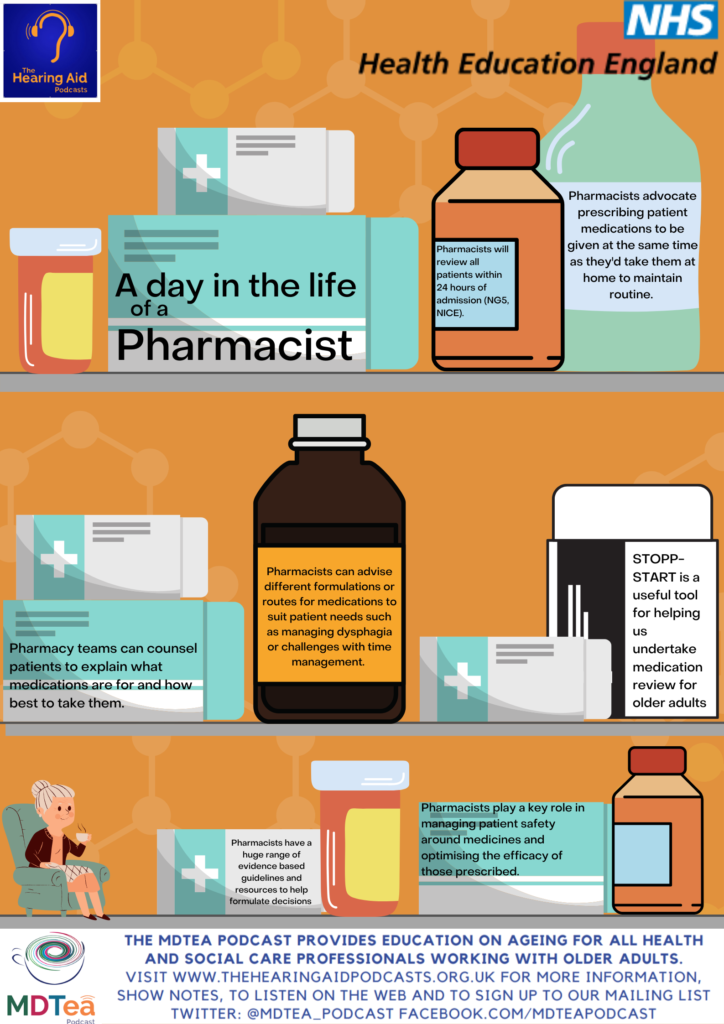11.4 A Day in the Life of a Pharmacist
Presented by: Iain Wilkinson, Stephen Collins and Georgie Gill
Contributors: Amisha Patel, Oliver Simmonds, Amelia Dale, Emily Knox
Broadcast date: 22 February 2022
Learning outcomes:
Knowledge:
- To understand the role of the pharmacist within the multidisciplinary team
- To consider the challenges and misconceptions that may impact our interaction with pharmacists within the team
Skills:
- To Know what pharmacists may consider when undertaking medicines reconciliation.
Attitudes:
- To be able to apply learning to support work of pharmacy teams as a team member
Social Media
BGS Timely Discharge blog, about a patient with Alzheimer’s dementia and the impact of a prolonged hospital admission due to a lack of care services to support discharge for those deemed Medically fit for discharge.
Webinar
In our Day in the life of a Nurse episode we discussed Tronto’s framework for the concept of ageing.
An Ethic of Care (Tronto) in: Ethics in Community-based Elder Care. Ed: M Holstein, P Mitzen. Springer. 2001
Pharmacists work at point of ‘taking care of’ identifying need and determining response to it, but are not ‘hands on’ in the way they deliver their care.
Key medicine related abbreviations:
ODS- once daily
BDS- twice daily
TDS- three times daily
QDS- four times daily
CR- controlled release
OM- once in the morning
ON- once at night
How will the pharmacy team help us care for Jean?
For her Parkinsons:
Madopar (Co-Beneldopa) 100/25mg QDS 7:30am, 11:30am, 3pm, 7pm
Madopar CR 200/50mg ON 10pm
For her Dementia:
Donepezil 10g ON
For Hypertension:
Ramipril 10mg OM
Amlodipine 10mg OM
Indapamide 2.5mg OM
For Postural Hypotension:
Fludrocortisone 150mcg OM- kept in fridge
For Hypercholesterolaemia:
Simvastatin 40mg ON
For Asthma:
Salbutamol 100mcg/dose blue inhaler
Co-Beneldopa
Co-Beneldopa is a medicine which contains two medicines in one. Levodopa and Benserazide. The benserazide ingredient helps levodopa get in to the brain where it can be converted to dopamine.
CR refers to controlled release, which is when medications are formulated in a way that they are dispersed more slowly to enable Jean to not have relapses in her Parkinsons symptom control overnight.
It’s really important parkinson’s medications are given on time, every time.
Antihypertensives
We discuss Jeans combination of antihypertensives. Having three different antihypertensives may be wrestling in a postural drop when she stands up. This can lead to dizziness, unsteadyness, and syncope events. This may be the cause of Jeans fall.
When medications or healthcare interventions are resulting in possible harm for patients we call this ‘Iatrogenesis’
Iatrogenesis is one of Bernard Issacs Five Geriatric Giants.
For patients over 65 like Jean, 20% of hospital admissions are caused by adverse effects of medicines.
Patients like Jean might not always see the same health care professional keeping track of prescribed meds can be difficult between systems, keeping track between primary care and secondary care inpatient and outpatient can be tricky, although the rise of electronic records is making this a bit simpler.
Repeat prescriptions make up three quarters of all prescription items and because they can be left without review for longer, therefore increasing the risk of over prescribing.
Patients have reported it is to talk to the medical team about medications because there were different clinicians in different places, and they lacked understanding their medications, or lacked confidence to talk to a doctor if they had side effects.
The good for you, good for us, good for everybody report highlighted a whole range of consequences impacting not just the patient, but also huge cost implications for the healthcare system and environmental impacts.
STOPP-START
Pharmacy teams review patient medications on arrival at hospital and throughout their admission. Pharmacists reconciling the medication chart might consider the STOPP-START guidelines.
Sometimes patients may have problems swallowing medications. This might be present for Jean as it can be problematic for patients with Parkinsons.
Pharmacists might work with other members of the MDT such as doctors and Speech and Language Therapists to ensure patients like Jean can receive their medications.
Parkinsons UK website has two calculators which can help us calculate the conversion doses of medications if patients cannot swallow.
Curriculum mapping:
NHS Key Skills Framework:
Core:
Communication 2
Communicate with a range of people on a range of matters
HWB4:
L2 Enable people to meet ongoing health and wellbeing needs.
L3 Plan , deliver and evaluate care to meet peoples health and wellbeing needs
NHS Key Skills Framework:
Core:
Health and Wellbeing 4:
Communication 2:
Communicate with a range of people on a range of matters
L2: Enable people to meet ongoing health and wellbeing needs.
L3: Plan , deliver and evaluate care to meet peoples health and wellbeing needs
Foundation Curriculum:
FY1
2.6
Describes the structure and importance of the wider healthcare team.
Works effectively within the healthcare team for the benefit of patient care.
Makes clear, concise and timely written and oral referrals to other healthcare professionals within the hospital.
2.7
Acts as a member of the multidisciplinary professional team by supporting, respecting and being receptive to the views of other healthcare professionals.
Works effectively with others towards a common goal e.g. accepts instructions and allocation of tasks from seniors at handovers and multidisciplinary team meetings.
4:20
Demonstrates understanding of the organisational structure of the NHS and independent sector and their role in the wider health and social care landscape.
Describes hospital and departmental management structure.
FY2
2.7: Interaction with Colleagues
Demonstrates initiative e.g. by recognising work pressures on others, providing support and organising / allocating work to optimise effectiveness within the clinical team
GP Training Curriculum
Clinical management:
Contribute to an organisational and professional approach that facilitates continuity of care (e.g. through adequate record keeping and building long term patient relationships)
Organise follow up of your patients after referral through multiprofessional, team bases and structured approaches including monitoring, reviewing and regular care planning.
Working with colleagues and in teams:
Enhance working relationships by demonstrating understanding, giving effective feedback and maintaining trust.
Appropriately seek advice from other professionals and team members according to their roles and expertise.
Core Medical Training curriculum
Define the role of rehabilitation services and the multi-disciplinary team to facilitate long-term care
Internal medicine training curriculum
2.3:
Communicates effectively and is able to share decision making, while maintaining appropriate situational awareness, professional behaviour and professional judgement
Geriatrics and higher specialty training curriculum
27:
Have knowledge of the range of agencies that can provide care and support both in and out of hospital and how they can be accessed
30:
Rehab and MDT working. Roles and expertise of different members of interdisciplinary team

